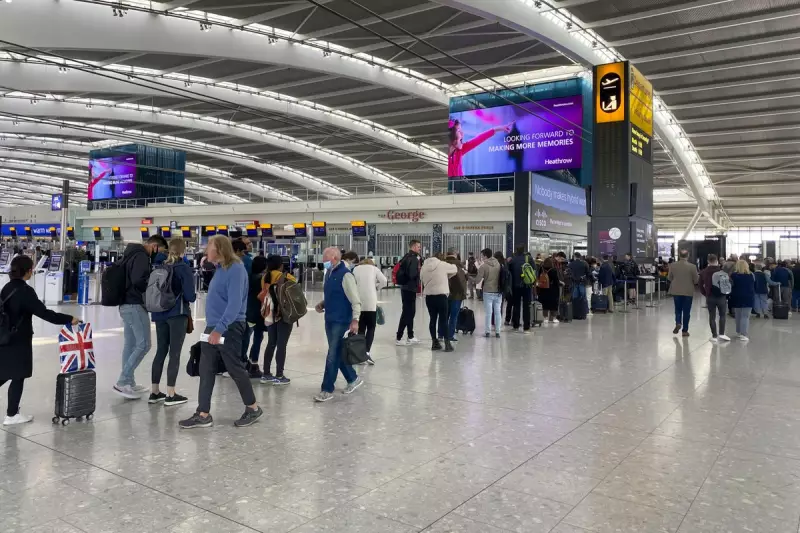
New official estimates reveal that net migration into the United Kingdom has fallen to its lowest annual figure since 2021, marking a dramatic 69% decrease from previous record levels.
Sharp Decline in Migration Numbers
The Office for National Statistics (ONS) published figures on Thursday 27 November 2025 showing that net migration dropped to 204,000 in the year to June 2025. This represents a substantial reduction from the 649,000 recorded during the same period the previous year, continuing a downward trend that has persisted for the past two years.
According to the detailed breakdown, an estimated 898,000 people immigrated to the UK in the year to June, while 693,000 people emigrated. The current figures stand in stark contrast to the peak recorded in the year to March 2023, when net migration reached a record 944,000 before beginning its sharp decline.
What's Driving the Change?
The ONS identified two primary factors behind the significant reduction. Fewer people from outside the European Union are arriving for work or study purposes, while simultaneously there has been an increase in people choosing to leave the country.
Mary Gregory, executive director for population and Census at the ONS, provided context for the figures. "Net migration is at the lowest level seen since 2021, when pandemic lockdown restrictions were lifted and the new immigration system was introduced following the UK's EU exit," she stated.
Gregory further explained that non-EU emigration is primarily driven by Indian and Chinese nationals who originally arrived on study visas. The data also reveals that nine out of ten British citizens emigrating from the UK are of working age.
Policy Changes and Political Responses
The declining migration estimates follow significant policy changes implemented by the previous Conservative government in early 2024, which restricted eligibility for work and study visas. The current Labour Government has announced additional plans aimed at further reducing migration levels.
These proposed measures include:
- Introducing "earned" settlement requirements
- Doubling the waiting period for indefinite leave to remain from five to ten years
- Implementing conditions such as clean criminal records and English language proficiency at A-level standard
- Creating fast-track options or extended waiting periods based on migrants' contributions to the UK
Home Secretary Shabana Mahmood responded to the figures, stating: "Net migration is at its lowest level in half a decade and has fallen by more than two-thirds under this Government. But we are going further because the pace and scale of migration has placed immense pressure on local communities."
Shadow home secretary Chris Philp acknowledged that the decline was driven by Conservative reforms but argued that further reductions are necessary. He emphasised that under a future Conservative government, only those making genuine contributions would qualify for permanent settlement, and benefits would be restricted to British citizens.
Detailed Breakdown of Migration Patterns
The ONS figures reveal interesting patterns across different demographic groups. More British nationals left the UK (252,000) than moved to the country (143,000) in the year to June 2025.
A similar trend emerged for EU-plus nationals, which includes the 27 EU countries plus Norway, Iceland, Liechtenstein and Switzerland. This group saw 155,000 people emigrate from the UK compared to 85,000 immigrating.
The negative net migration for British and EU-plus nationals was offset by positive net migration for non-EU-plus nationals, with 670,000 people moving long-term to the UK versus 286,000 leaving. However, even this category has seen notable changes, with arrivals falling 37% year-on-year and departures increasing by 20%.
Public Perception Versus Reality
Despite the significant decline in net migration, research suggests that public perception hasn't caught up with the new reality. Sunder Katwala, director of think tank British Future, described the latest estimate as "another significant drop" but noted that polling indicates most people believe immigration has increased.
New research by Ipsos and British Future reveals that 56% of the public mistakenly believe net migration rose last year. Katwala commented: "It is time that our immigration debate caught up with reality. Some voices will never be satisfied until immigration is net zero – but they can't claim to speak for most of the public. With numbers returning to pre-Brexit levels, we need an immigration politics for 2025 and beyond."
The substantial decline in net migration represents a significant shift in UK demographic patterns, though the gap between statistical reality and public perception suggests the political debate around immigration is likely to continue evolving as the new figures are absorbed and analysed.





